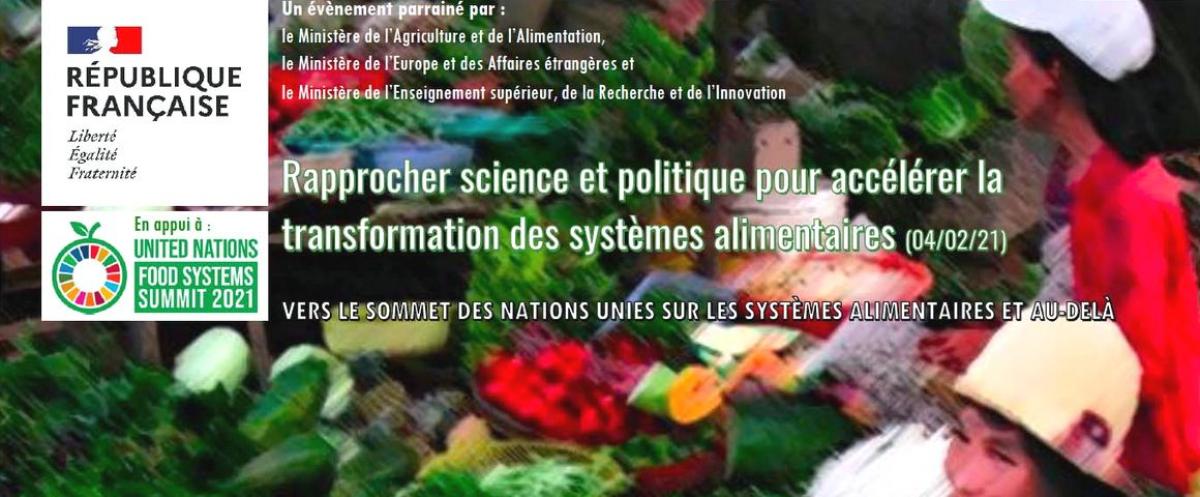Diets are at the heart of the massive issues. By 2050, there will be approximately 10 billion men and women on the planet. Feeding everyone without exacerbating poverty, accelerating deforestation and increasing our emissions would be impossible without initiating major changes to our food systems now.
Science-policy interfaces, a powerful engine to transform our food systems
The evolution of food systems depends on the decisions and practices of a wide range of actors, holders of their own interests, and divergent visions of the future and strategies, linked by unbalanced power relations. Science-policy interfaces play a crucial role in this complex interplay of relationships. Strengthening these interfaces and making them more active, ambitious, and productive can be a powerful driver for transforming food systems. Changes in position are necessary to enhance dialogues between scholars, politicians, and civil society. In addition to their role as forerunners and providers of knowledge, scientists must invest themselves in order to better influence the future of their research and make it available. While politicians should make better use of scientific knowledge in decision-making.
‘Extraordinary business’ to reinvent food systems
Scientific policy interfaces take many forms. To ensure the coherence of the transformation of diets, these interfaces must be strengthened, but also connected and articulated. Creating new interfaces is not necessarily the right solution.
The “unusual business” proposed here revolves around four pillars:
- Produce knowledge, data, and actionable tools for developing compromises, overcoming obstacles to change, particularly conflicts of interest, asymmetry of power and weight of habit, and managing risks and uncertainties;
- Formulate local models, knowledge and innovations in order to design, implement and evaluate ways of transforming food systems: this requires specific mechanisms, dialogue and methods, particularly scientific ones;
- Connecting and integrating expertise to address multi-sectoral and multi-scale challenges is essential to address challenges related to environment, climate and food;
- Foster scientific collaboration through alliances and ambitious programs that focus on key challenges.
Without science-policy interfaces, there is no transformation
There is an urgent need to build new, more sustainable, more equitable systems and healthy vectors for all. Scientific communities are willing to participate. Policy makers are eager to make better use of science to inform decisions and policies. The Covid-19 pandemic has shown that it is possible to benefit from the graceful interfaces between political science. The priority today is to implement mechanisms that will better link science and politics through the promotion of deliberative dialogues. There is something to be optimistic about: there are examples of this type of interface.
This is the time to learn from well-known examples, evaluate and link them to amplify their impact and innovate to build the future we want. Science-policy interfaces will play a critical role if they help articulate divergent visions, to transcend the polarization and fragmentation of sectoral debates, if they help anticipate the future and bring together global and local actions and processes.
At the request of the UNFSS Scientific Committee, these recommendations were also communicated in the Drafting Brief (in English) on science-policy interfaces: How can science-policy interfaces advance food system transformation? This document was written by CIRAD, the International Food Policy Research Institute (Ifpri), and the think tank.
The event brought together over 600 people from 60 countries on February 4, 2021. Rich in many presentations and interactions between public policy actors, civil society, the private sector and the scientific world, it addressed the issue of science-policy interfaces as drivers of projected changes in world food systems.
Event organizing committee: P. Caron, E. Hainzelin, A. Harding, R. Echeverria, M. Broin, M. Enriquez, C. Anderson.
More information about the event

“Subtly charming problem solver. Extreme tv enthusiast. Web scholar. Evil beer expert. Music nerd. Food junkie.”


